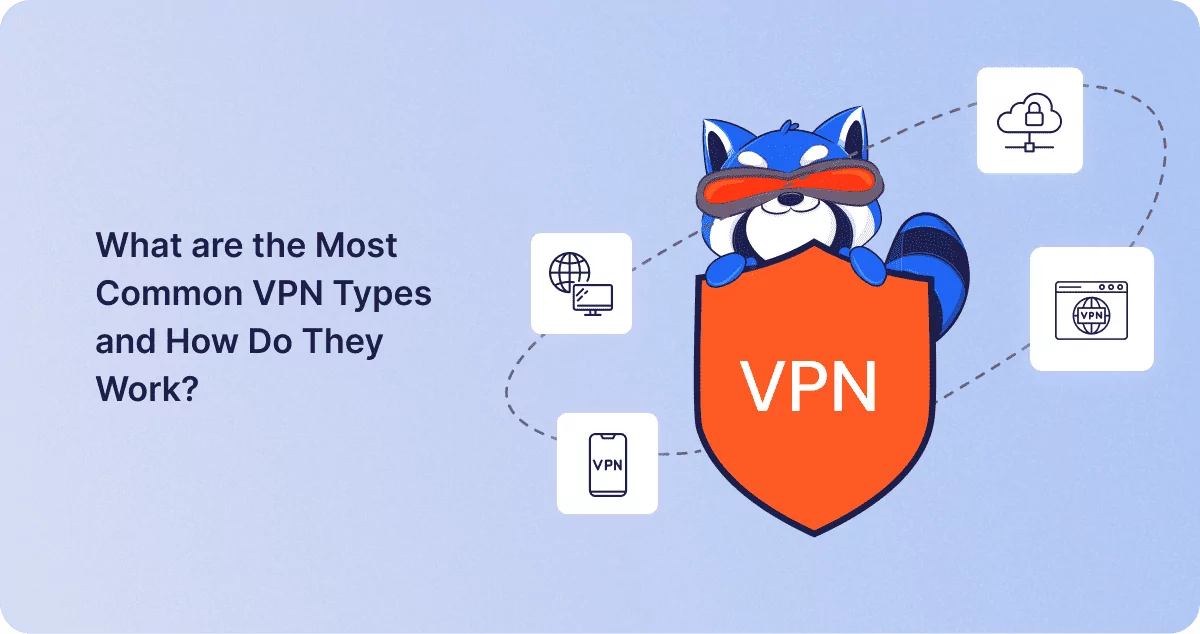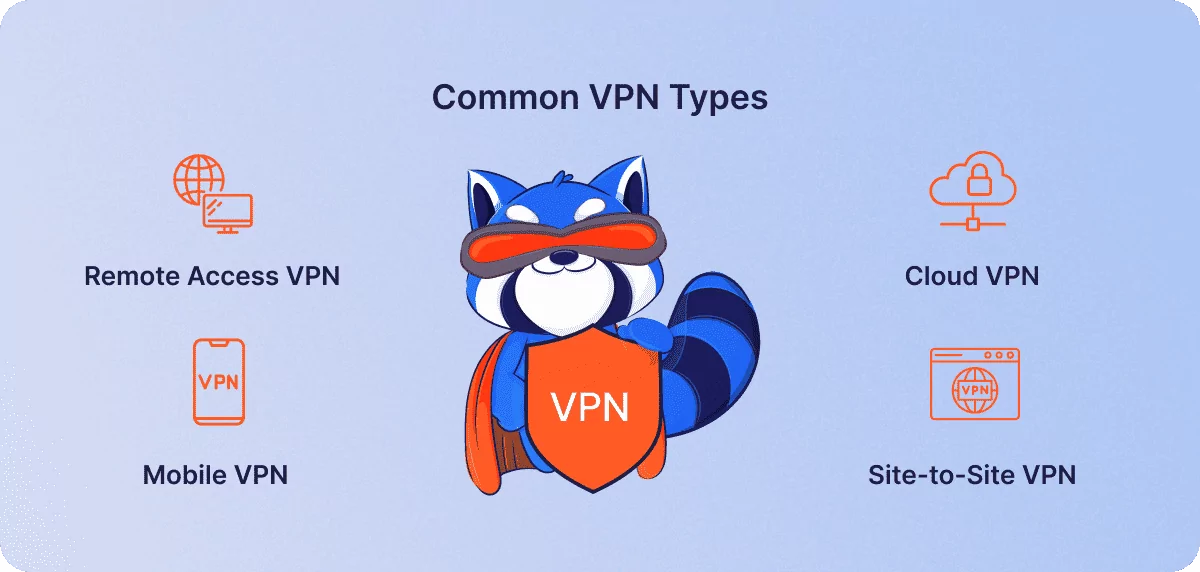What are the Most Common VPN Types and How Do They Work?
1Click VPN Team in cybersecurity
17.06.2024 | 3 min read

Table of contents
In the digital age, Virtual Private Networks have quickly become the go-to tools for enhancing user privacy and protecting data. As a result, the VPN market has experienced a major boom, with a slew of VPN providers emerging, each offering their own services with distinct features and use cases.
With such an array of options available, it can be difficult to discern between VPNs and Proxies. So, to help you navigate the VPN space, let’s briefly explain the most common VPN types and their workings.
Common VPN Types
VPNs are evolving all the time, but they can broadly be broken down into four main types:
- Remote Access VPN: Remote Access VPNs are ones that enable users to connect remotely to a private network via a VPN extension or client. This type of VPN is typically used by private individuals and companies whose employees need to access internal resources remotely.
- Mobile VPN: Mobile VPNs are created specifically for mobile devices. These VPNs are optimized to deal with changes in network types, meaning they enable users to maintain stable, secure connections on the go, regardless of whether they’re using mobile data or public Wi-Fi networks.
- Cloud VPN: Cloud VPNs are designed to provide secure access to cloud resources through an application or website. These VPNs are commonly offered by cloud service providers such as AWS and are used by businesses to establish secure connections between on-site resources and cloud-based resources.
- Site-to-Site VPN: Site-to-Site VPNs establish secure connections between entire networks, and so are typically utilized by businesses with multiple office locations. This type of VPN can be intranet-based, connecting internal networks, or extranet-based if connecting to external networks.
What are the most common VPN protocols?
Even within the categories outlined above, not all VPNs are made equal, and the primary factor that separates them is the VPN protocols they use, as these are what determine the rules for how data is transferred. The following are some of the best VPN protocols in common use today:
- IPSec/ L2TP: IPSec (Internet Protocol Security) is a protocol suite that secures communications by authenticating and encrypting each IP packet in a session. It operates at the network layer to effort end-to-end encryption and has both transport and tunnel modes. L2TP is a tunneling protocol that does not encrypt user data, but is often used in conjunction with IPSec to establish secure connections. L2TP/IPSec utilizes double encapsulation of packets to offers strong security, at times at a slight compromise to speed.
- OpenVPN: OpenVPN is an open-source protocol that can operate on any port. It is highly versatile in terms of configuration and supports both UDP (User Datagram Protocol) and TCP (Transmission Control Protocol). By using these communication protocols in conjunction with AES 256-bit encryption, Open VPN provides a high degree of security and flexibility.
- IKEv2: IKEv2 (Internet Key Exchange version 2) is a protocol that works in tandem with IPSec to maintain secure, stable VPN connections. It is characterized by its capacity for quick reconnection following network changes, making it well-suited to mobile use.
- SSL & TLS: SSL (Secure Sockets Layer) and TLS (Transport Layer Security) are secure protocols that operate the transport layer to maintain secure, stable communication for TCP connections. They are widely used to secure data between clients and web servers.
- WireGuard: WireGuard is a new VPN protocol that aims to be simpler and more efficient than existing VPN protocols. It uses with advanced cryptography and a low-code foundation to reduce potential security vulnerabilities and is known for being fast and easy to configure.
Understanding VPNs
As online security and privacy have become increasingly important to Internet users everywhere, Virtual Private Networks have emerged as the go-to solutions for Internet communications. With a growing range of VPN options on offer, each suited to different users and situations, understanding what differentiates VPNs is now essential to ensuring that your security and privacy needs are adequately met.
By understanding the different types of VPNs and the most common VPN protocols, you can parse the myriad VPN options on the market, identify the solution that’s right for you, and proceed on your digital journey with absolute freedom and peace of mind.
Similar posts

Why some countries block WhatsApp and how to unblock it
Why do some countries block WhatsApp? As in so many walks of life, one of the primary reasons for governments doing anyt…

8 Online Smart Travel Hacks Supercharged by VPN
A virtual private network (VPN) allows you to access the internet via an encrypted ‘tunnel’ to a secure server before co…
